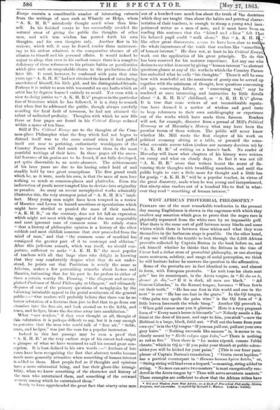WEST AFRICAN PROVERBIAL PHILOSOPHY.*
PEnnArs one of the most remarkable tendencies in the present day among Englishmen is shown in the eagerness with which they swallow any assertion which goes to prove that the negro race is physically separated from the white race by an impassable gulf. That there is the same sort of gulf between many blacks and some whites which there is between these whites and what they were themaelVes in the barbarous stage is possible. On the other hand, if any one willitake the trouble to look through the 2,268 African proverbs collected by Captain Burton in the book before us, and ask himself whether he thinks that the Britons in the time of Cesar had a richer store of proverbial philosophy, or one showing more acuteness, subtlety, and range of social perception, we think he will hesitate before he answers the question in the affirmative.
Some of the proverbs are in fact identical in sense, and almost in form, with European proverbs. "La nuit toes les chats sont gris" has its counterpart, in the Accra tongue, in "Ke dsena le, gbomei fe dio,"—" If it is dark, all men are black." " Ad Grxcas Calendas," in the Kanuri tongue, becomes " When fowls cut their teeth." " He has one foot in this world and one in the next " is our " He has one foot in the grave." In the Oji tongue, "One palm tree spoils the palm wine" is the Oji form of " A little leaven leaveneth the whole lump." Another Oji proverb is, " When gold comes near you it glistens." Here is a very pregnant form of " Every man's house is his castle "—" Nobody assails a Ha- hinni at the door of his nest, and says to him, you stink"—now the liahinni is a large, black, fetid ant. "Pull out the beam from your own eye" is in the Oji tongue "If you can pull out, pull out your own grey hairs." "Nothing succeeds like success" is, it seems to us, clearly meant by " Biribi enkyen ogya koko,"—" There is nothing so red as fire." Then there is " Le moine repond, comme labb6 chante," which in Oji is " If you point your thumb at public solem- nities you will be kicked for your pains." [This is our freer para- phrase of Captain Burton's translation.] " Gutta cavat lapidem " has a poetical counterpart in " Hamma hamma kyirre ketebo," or, " String string will bind even a leopard,"—meaning, string added to string. " No man can serve two masters " is most energetically ren- dered in the Accra tongue by " Thou wilt serve seventeen masters." These examples are sufficient to show that the African tribes have
* Wit and Wisdom from West Africa; or, a Book of Prorsrbial Phil isophy, Idioms, Enigmas, and Laconisms. Compiled by Richard F. Burton. London; Taialey,
generalized the results of social observation so as in many instances to hit upon the identical thoughts of the very people who despise them. But if we leave such coincidences aside, and look at the collection of proverbs generally, it is surprising what a range of worldly wisdom they embrace, and how subtle are some of the trains of thought. " No sleep, no dream," shows the most delicate sensitiveness to metaphysical thought, elemen- tary, it is true, but keen and strong. " A tree which has no fork is difficult to climb" is a half civilized, but fresh and powerful version of the Latin "Divide et impera." " No one gives a pig to a hyena to keep" is a perfect sample of shrewd, worldly, administra- tive wisdom which the Comptroller of the Exchequer would have done well to apply to the case of Mr. Edmunds. We have put the following into vernacular English, in order to render it more intelligible :—" If the devil goes to church, he goes from the witch's house." " The face of water is beautiful, but it is not good to sleep on it." " Clear water is not wanted for quench- ing fire,"—a motto this which ought to be inscribed by The Re- cord over its office as its own peculiarly. " People do not look into a bottle with both eyes " sounds very deep and wise, but we do not catch its drift, to our great regret, it seems so exceedingly neat and clear. " Whoever wants me as I am, is content," is the very milk of young arrogance. There is almost Shakespearian roguery about it. "Two crocodiles do not live in one hole,"—and yet Mr. Gladstone and Mr. Disraeli can converse amicably together at one another's houses, so far have the sons of Church and State risen above the sons of the forest. "The young wild hog asked his mother, Mamma, what are the warts in thy face ?' She replied, ' By and bye, thou wilt have seen it already." Anglice, "You'll have a few on your own, dear, soon (bless the sweet cherub's impudence)." " The grub becomes a butterfly " is the Yoruban sneer for " Set a beggar on horseback," but it would do equally well, or better perhaps, to express that small beginnings may lead to great ends. The Efiks are of opinion that " Hunger spoils love,"—so, Juan found, does sea-sickness " The evil-doer is ever anxious" proves that the Yorubans have an undeveloped theory of Conscience. " Though the glow-worm never kindles a fire, yet it travels with glowing fire at its tail," is another proverb which, so far as we are concerned, is in a virgin state, and waits for an appli- cation. "You cannot shave a man's head in his absence" might be a very savage denial of the French saying, "Les absents out toujours tort," were we not informed that it has no cynical mean- ing.
Some of our readers may imagine that this reviewer is per- fectly familiar with the Wolof, Kanuri, Oji, Accra, Yoruban, and other African tongues. He is not though, and so our readers, as well as ourselves, must take Captain Burton's Yoruba, Accra, Oji, Kanuri, Wolof, and other accomplishments upon trust. May they have the childlike faith that we have ! though even we confess that Biribi enkyen ogya koko sounds to us very much like the Bimbrrr bimbrrr boo, timbrrr timbuctoo of the song we all know so well, which says so very much and means so very little. Does Captain Burton know all these tongues, really now? Are these proverbs bona fide ? Or has he, with the consummate audacity of a consummate traveller, invented seven languages and two thousand two hundred and sixty-eight proverbs? If he has, he is such a bold and clever scoundrel-rogue that we forgive him, and herewith bestow upon him our blessing and absolution. Benedicare Burton !



































 Previous page
Previous page